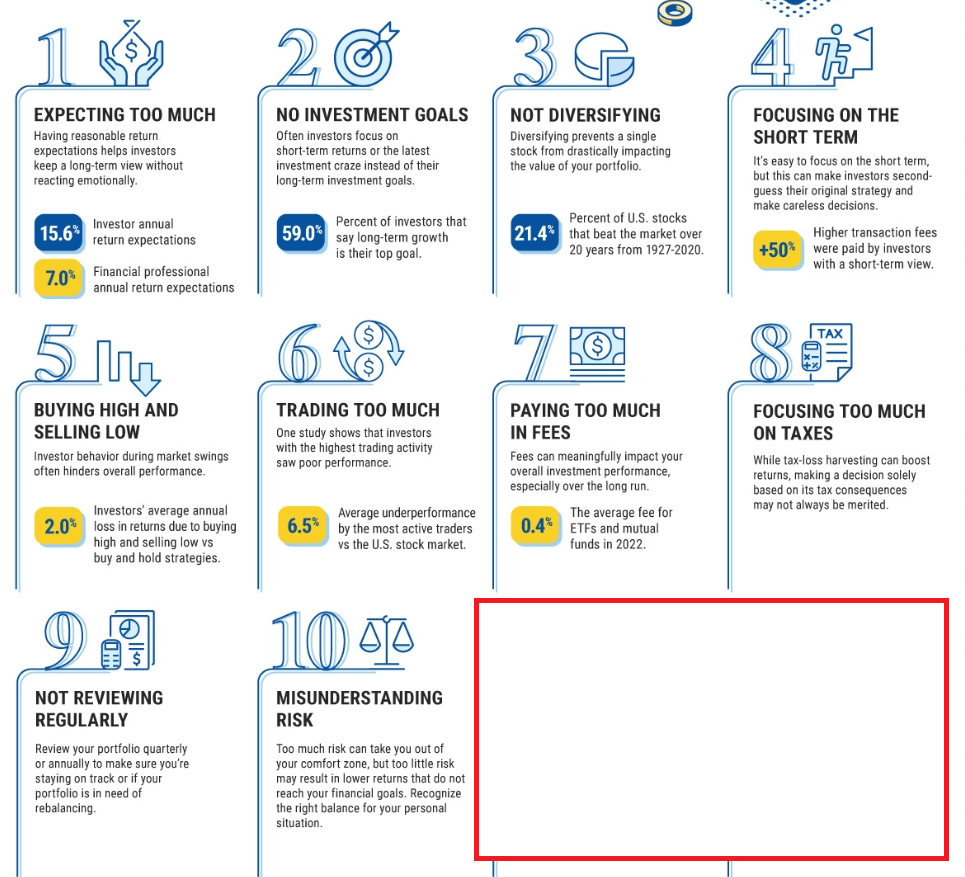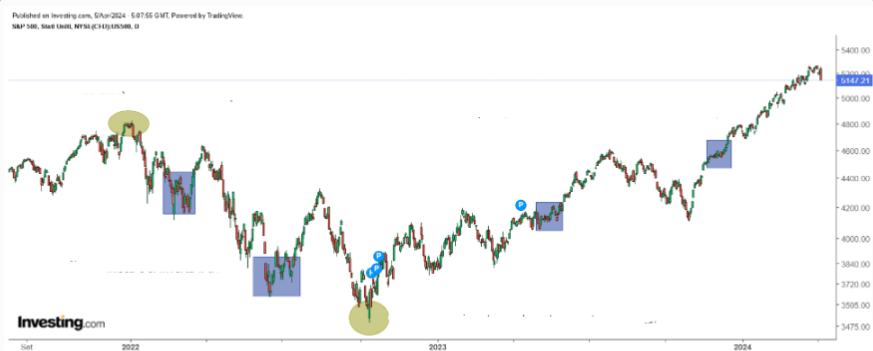- This article delves into the initial ten pitfalls from a comprehensive list compiled by Visual Capitalist and the CFA Institute.
- From vague investment goals to neglecting diversification, they shed light on crucial aspects often overlooked.
- These mistakes offer valuable lessons for investors who wish to achieve long-term financial success.
- Invest like the big funds for less than $9 a month with our AI-powered ProPicks stock selection tool. Learn more here>>
Visual Capitalist, in collaboration with the CFA Institute, compiled a list of common mistakes made by many investors. Intrigued by the topic, I added my insights to each of these mistakes.
Since the list contains 20 items in total, I've divided it into two articles and this is part one. Let's begin by examining the first 10 errors on the list: 
Source: Visual Capitalist, CFA Institute
Now that we have listed them, let's explore each point in depth:
1. Expecting Excessive Returns (+1)
Investors often believe that investing leads to quick and effortless profits. However, this notion is far from reality, as exemplified by cases like Madoff's Ponzi scheme, where promises of consistent 10% returns landed him in jail.
Another common mistake (+1) is waiting too long to invest. Many individuals hold off on investing because they wait for market downturns to end and for prices to recover.
Then, when markets are expensive, they hesitate to invest, hoping for better prices in the future.
The chart below provides a clear illustration of this concept.

2. No Investment Goals, 3. Not Diversifying
Regarding the second and third goals (to have no goals and to diversify), I would say that having clear goals and diversification are fundamental in long-term financial planning.
Clear goals provide a defined endpoint and a reference point to work towards. Diversification, on the other hand, proves its value when things go south, showing its importance in managing risk effectively.
4. Focusing on the Short-Term
The fourth mistake is a common one, as I mentioned months ago in another analysis. Nowadays, investors typically hold onto stocks for an average of 6 months, even though historically, the best returns in the stock market have been seen over 16 years.
Social media and the modern age have made us impatient, and expecting instant results. However, in the markets, things don't work that way. Forgetting this fundamental principle can have serious consequences for our savings.
5. Buying High and Selling Low
One of the most intriguing phenomena is Mistake #5, which I discussed directly with Howard Marks (video below). Interestingly, when prices rise, people tend to buy more, even though prices are higher and the risk is greater.
Conversely, when prices fall during market corrections, assets become cheaper, risk decreases, and potential returns increase. However, at this point, few investors buy, despite the favorable conditions. This pattern is both puzzling and fascinating.
6. Trading Too Much, 7. Paying Too Much in Fees
Points 6 and 7 are closely linked: frequent trading often leads to losses (as evidenced by the fact that 80 percent of trading accounts end up losing money) and typically results in underperforming the market.
When Buffett states that "investing is simple but it's not easy," he implies (as seen in the video below) that purchasing an ETF mirroring the S&P 500 index and holding it for 15 years is a straightforward task.
However, the real challenge lies in resisting the urge to intervene during those 15 years. Throughout this period, we'll encounter a constant barrage of news, information, psychological factors, and political events, all of which may tempt us into taking action.
Yet, the data suggests that inaction is often the best course of action. Making changes to investment portfolios incurs additional costs in the form of commissions and fees.
8. Not Reviewing Investments Regularly, 9. Focusing Too Much on Taxes
Let's focus on points 8 and 9, especially the first one. It's another trick to boost performance, manage risk better, and avoid mistake No. 5: rebalance your portfolio. Make it a habit to do this regularly, at least once a year or every two years.
By doing so, you sell assets that have increased in value the most and buy those that have declined (the opposite of mistake #5). Keep it mechanical, meaning without emotions, and you'll steer clear of many other errors, like #6.
10. Misunderstanding Risk
In my line of work, I've noticed a common mistake: clients often claim they're not worried about market drops and even plan to buy more as prices fall.
However, when the market dips just 3%, they panic and want to sell everything, fearing a crash. It's crucial to understand your risk tolerance before investing any money.
Growing your wealth over time to reach your goals is challenging for everyone. It takes considerable confidence and patience to prove yourself right, and success doesn't come easily.
Interview with Howard Marks:
***
INVESTINGPRO+ DISCOUNT CODE
Take advantage of a special discount to subscribe to InvestingPro and take advantage of our tools to optimize your investment strategy. (The link directly calculates and applies the additional discount dedicated to you. In case the page does not load, you enter the code PRO124 to activate the offer).
Disclaimer: This article was written for informational purposes only; it does not constitute a solicitation, offer, advice, counseling or recommendation to invest as such it is not intended to incentivize the purchase of assets in any way. I would like to remind you that any type of asset, is evaluated from multiple points of view and is highly risky and therefore, any investment decision and the associated risk remains with the investor.

